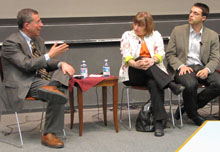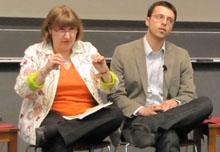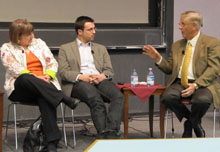
April 5, 2010 — What role does new media play in covering health care reform? To answer this question, a panel including Robert Blendon, professor of health policy and management at the Harvard Kennedy School and Harvard School of Public Health; Dr. Timothy Johnson, medical editor at ABC News; Ezra Klein, blogger on economic and domestic policy for Washingtonpost.com and columnist for Newsweek magazine; and Julie Rovner, health policy correspondent for National Public Radio, gathered at a Shorenstein Center event co-sponsored by the Health Policy Professional Interest Council and the Communications & Media Professional Interest Council as part of HKS’s Public Service Week.
Blendon emphasized the importance of the media in the health care debate, and said that journalism is “crucial to the nation understanding how this policy works.” Rovner agreed that although the “horse race is over,” and the health care bill has been passed, there is still an “interim step” before implementation, which is to “explain to the confused public what’s in the law and how they might be affected by it.” She found that in reporting on the health care debate, there was a “struggle to put policy above politics.” Dr. Johnson agreed that the policy vs. politics debate was difficult, and while ABC News had chosen to focus on the political aspect of the story, he believed the focus should have been on policy.
The “bad news,” Klein said, is that “the media is terrible at doing what it needs to do.” But the good news is: “It doesn’t really matter.” He sees the political structure that existed before the bill was passed as having the greatest influence on its success, and he is skeptical about how big a role health care reform will play in the mid-term elections. However, Blendon sees the drastic political gaps between the parties as forcing health care to remain the key issue in the elections.
To illustrate the complicated aspects of the health care bill, Klein said he has “made charts and graphs — we’ve made so many graphs,” yet the public still seems vastly unaware about the complexities of the bill. While new media technology provides “more resources than ever” for citizens to get information about health care legislation, politics rather than education is driving the debate. Dr. Johnson was similarly “appalled” at lack of knowledge among intelligent citizens concerning aspects of the health care bill. Rovner cited an example of a colleague reporting on a tea party meeting who called her to verify the wildly inaccurate rumors that were being passed around as truth.
Dr. Johnson sees “battles yet to come” that will deal with the unavoidable issue of controlling costs. “But no one wants to talk about that aspect of it,” he said.
This article was written by and photos were taken by Janell Sims of the Shorenstein Center.



